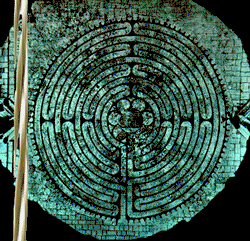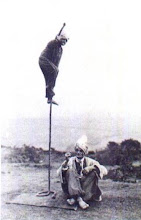
I can't believe this album is out of print; changing hands at thirty-five quid for a second hand CD version: ridiculous!
Most of Hawkwind's back catalogue is available at much reduced price; yet this, what has to be one of their finest albums, isn't.
Of all the Hawkwind albums, this has to be the most musically ambitious and progressive - in the genre sense - of their entire discography; and as an album; a singular piece of work; a whole, complete product; it could well be their masterpiece.
And the original vinyl edition cover did this when opened out fully:

And this on the other side:

Cosmic!
They did some great things with their covers did Hawkwind; my favourite has to be the blanket sized enormity of the original
Space Ritual; man, how we used to pour over those things.
The band were at their peak during this period; and with two drummers and Lemmy as a rhythm section there's some pretty pounding, almost industrial rhythms accompanying many of the tracks.
(Lemmy has stated that he hated this period of working with Hawkwind, with 'fascistic drummers taking over the sound', but has also admitted that
Warrior does contain some quite superb cuts.)
In fact, it's quite trancy in places, a little Neu, even; but essentially
Warrior is a very heavy album, with long instrumental breaks, allowing the band to really show off their development and their chops.

To bring in Moorcock was a masterstroke.
Dave Brock knew his audience; and he was right, we were all reading
Runestaff,
Elric, and the brilliant
Jerry Cornelius' stories.
Moorcock was the writer of space rock: the absolute literary equivalent of their music.

Poet, Bob Calvert, had become so much a part of the band's identity and sound he was sorely missed (absent: later to rejoin for
Astounding Sounds), the poetry added something quite essential to their sound at the time; Moorcock was the perfect replacement, filling Calvert's role admirably; and in places sounding uncannily similar to the original Hawkwind 'Space Poet'.
The poetry nuzzles its way in between the tracks, often acting transitionally between the pieces of music.
Many of the segues on this album are so seamless, and I think so essential to the listening experience I haven't interrupted them; to have done so would would have been criminal; so some tracks are grouped together as single mp3s; but I'm sure you'll agree: many of these pieces run together like suites, and that's how they should be heard.
The album ends with the classic Hawkwind tune: Moorcock and Brock's 'Kings of Speed'; a track that somehow encapsulates all that both the writer and the band stood for during this period.
And it still sounds great.
Ear whizz to add a spring to anyone's step; a great big aural injection of energy: a mainline straight to the psyche.
Hawkwind -
Warrior on the Edge of Time (1975)
Assault & Battery Part I
The Golden Void Part II
The Wizard Blew His Horn
Opa-Loka
The Demented Man
Magnu
Standing at the Edge
Spiral Galaxy 28948
Warriors
Dying Seas
Kings of Speed
Excellent vinyl rip @320kbs
Go inner space
here
 Essentially, Hot Tuna were a live act - can you get anymore ostentatious than a Flying V bass? - and their recorded output verified that: the essential live Double Dose is easily their greatest album; but as studio albums go, I think this is by far the best of the bunch.
Essentially, Hot Tuna were a live act - can you get anymore ostentatious than a Flying V bass? - and their recorded output verified that: the essential live Double Dose is easily their greatest album; but as studio albums go, I think this is by far the best of the bunch. Phosphorescent Rat (1973) suggested where it was going, and by the time they arrived at Yellow Fever (1975) their sound had hardened; tightened; become heavier; with the band playing much more as a single unit rather than that loose homestead feel associated with their earlier incarnation.
Phosphorescent Rat (1973) suggested where it was going, and by the time they arrived at Yellow Fever (1975) their sound had hardened; tightened; become heavier; with the band playing much more as a single unit rather than that loose homestead feel associated with their earlier incarnation.
































